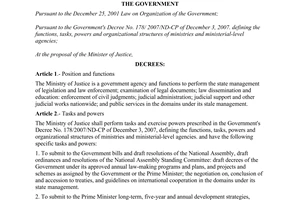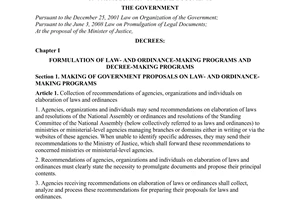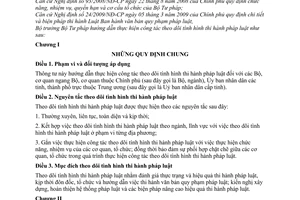Nội dung toàn văn Circular No. 03/2010/TT-BTP, guiding the monitoring of law observance
|
THE
MINISTER OF JUSTICE |
SOCIALIST
REPUBLIC OF VIET NAM |
|
No. 03/2010/TT-BTP |
Hanoi, March 03, 2010 |
CIRCULAR
GUIDING THE MONITORING OF LAW OBSERVANCE
Pursuant to the Government's
Decree No. 9.?/ 2008/ND-CP of August 22, 2008, defining the functions, tasks,
powers and organizational structure of the Ministry of Justice;
Pursuant to the Government \ Decree No. 24/ 2009/ND-CP of March 5, 2009,
detailing and measures for the implementation of the Law on Promulgation of
Legal Documents,
The Minister of Justice guides the monitoring of law observance as follows:
Chapter I
GENERAL PROVISIONS
Article 1. Scope and subjects of application
This Circular guides the monitoring of law observance by ministries, ministerial-level agencies and government-attached agencies (below referred to as ministries and branches) and People*s Committees of provinces and centrally run cities (below referred to as provincial-level People's Committees).
Article 2. Principles of monitoring law observance
Monitoring of law observance must adhere to the following principles:
1. Regularity, continuity, comprehensiveness and promptness;
2. Branch- and domain-based monitoring in combination with monitoring in each locality:
3. Monitoring in association with performance of functions and tasks of agencies and organizations, while ensuring close coordination among agencies and organizations in the course of monitoring law observance.
Article 3. Purposes of monitoring of law observance
Monitoring of law observance aims to assess the actual situation and effectiveness of law observance: urge, organize and guide in time the implementation of legal documents: and propose the building and improvement of the legal system and measures to raise the effectiveness of law observance.
Chapter II
CONTENTS OF MONITORING OF LAW OBSERVANCE
Article 4. Contents of monitoring law observance
Monitoring of law observance shall be based on monitoring and assessment of the following:
1. Promulgation of detailing and guiding legal documents, and documents directing, urging and organizing the implementation of legal documents of superior state agencies and competent state agencies at the same level:
2. Law observance by agencies, organizations and individuals;
3. Effectiveness of law propagation and dissemination;
4. Rationality of legal provisions;
5. Measures to organize, and
conditions for
ensuring, law enforcement.
Article 5. Contents of assessing the promulgation of detailing and guiding documents, and documents directing, urging and organizing the implementation of legal documents of superior state agencies and competent state agencies at the same level
1. Number and forms of documents to be elaborated and promulgated as prescribed in legal documents of superior state agencies and competent state agencies at the same level.
2. Number and forms of documents
elaborated and promulgated on schedule.
3. Number, forms and names of documents elaborated and promulgated behind schedule; and reasons for such delay.
4. Promulgation of documents directing, urging and organizing the implementation of legal documents.
Article 6. Contents of assessing law observance by agencies, organizations and individuals
1. General situation of law observance by agencies, organizations and individuals.
2. Failure to observe, or poor observance of. legal provisions in reality.
3. Number, form and severity of violations of agencies, organizations and individuals.
4. Competent state agencies' handling of each type of violation.
5. Reasons for failure to observe, or poor observance of. legal provisions.
Article 7. Contents of assessing the effectiveness of law propagation and dissemination
1. Improvement of law awareness of agencies, organizations and citizens after being targeted by law propagation and dissemination.
2. Law propagation and dissemination's impacts on the sense of law observance of agencies, organizations and citizens.
3. Cases of violation due to negligence.
4. Proposition of measures to raise the effectiveness of law propagation and dissemination.
Article 8. Contents of assessing the rationality of legal provisions
Assessment of the conformity of legal provisions with:
1. Socio-economic conditions:
2. People's intellectual standards:
3. Cultural traditions and customs and practices;
4. Requirements of the reality.
Article 9. Contents of assessing measures to organize, and conditions for ensuring, law enforcement
1. Measures to organize law enforcement.
2. Funds for organizing law enforcement.
3. Actual situation of organizational apparatus and contingent of employees performing law enforcement tasks to meet requirements. Conditions on equipment and physical foundations for law enforcement.
4. Difficulties and problems in organizing law enforcement: management and use of funds: organizational apparatus and contingent of employees performing law enforcement tasks.
Chapter III
MECHANISMS FOR AND METHODS OF MONITORING LAW OBSERVANCE
SECTION I. MECHANISMS FOR MONITORING LAW OBSERVANCE
Article 10. Mechanisms for monitoring law observance
Monitoring of law observance shall be conducted under the following mechanisms:
1. Monitoring of law observance nationwide:
2. Branch- and domain-based monitoring of law observance;
3. Monitoring of law observance in localities;
4. Monitoring of law observance based on information provided by agencies, organizations, enterprises and individuals.
Article 11. Monitoring of law observance nationwide
1. The Ministry of Justice shall monitor law observance nationwide on the basis of monitoring law observance in each branch, domain or locality and synthesizing, analyzing and processing law observance information provided by agencies, organizations, enterprises and individuals.
2. Ministries, branches, provincial-level People's Committees and concerned agencies and organizations shall coordinate with the Ministry of Justice in monitoring law observance in the domains under their management.
Article 12. Branch- and domain-based monitoring of law observance
1. Ministries and branches shall monitor law observance in the domains under their management.
a/ Legal departments of ministries and branches shall assume the prime responsibility for. and coordinate with agencies and units under their ministries and branches in. advising and assisting ministers, heads of ministerial-level agencies or government-attached agencies in monitoring law observance in the domains under the management of ministries and branches.
b/ Agencies and units under ministries and branches shall assume the prime responsibility for, and coordinate with legal departments in. assisting ministers, heads of ministerial-level agencies or government-attached agencies in monitoring law observance in the assigned domains; report on law observance under Chapter IV of this Circular and send reports to legal departments for summarization and reporting to ministers, heads of ministerial-level agencies or government-attached agencies.
2. The Ministry of Justice shall monitor law observance in the domains under its management.
a/ The Department for General Affairs on Legislation shall assume the prime responsibility for. and coordinate with agencies and units under the Ministry of Justice in. advising and assisting the Minister of Justice in monitoring law observance in the domains under the Ministry's management.
b/Agencies and units under the Ministry shall assume the prime responsibility for. and coordinate with the Department for General Affairs on Legislation in, assisting the Minister of Justice in monitoring law observance in the assigned domains; and send reports on law observance under Chapter IV of this Circular to the Department for General Affairs on Legislation for summarization and reporting to the Minister of Justice.
Article 13. Monitoring of law observance in localities
Provincial-level People's Committees shall monitor law observance in the domains under their management in localities.
1. Provincial-level Justice Departments shall advise and assist provincial-level People's Committees in monitoring law observance in the domains under management of provincial-level People's Committees; and assist the Minister of Justice in monitoring law observance in the domains under the Justice Ministry's management in localities.
2. Specialized agencies of provincial-level People's Committees shall coordinate with provincial-level Justice Departments in monitoring law observance in the assigned domains; and send reports on law observance under Chapter IV of this Circular to provincial-level Justice Departments for summarization and reporting to provincial-level People's Committees.
Article 14. Monitoring of law observance based on information provided by agencies, organizations, enterprises and individuals
1. Ministries, branches and localities shall monitor law observance based on information provided by agencies, organizations, enterprises and individuals.
2. Legal departments of ministries and branches and provincial-level Justice Departments shall assume the prime responsibility for, and coordinate with concerned agencies, units and organizations in. advising and assisting ministers, heads of ministerial-level agencies or government-attached agencies and chairpersons of provincial-level People's Committees in receiving, synthesizing, assessing and processing law observance information provided by agencies, organizations, enterprises and individuals.
SECTION 2. METHODS OF MONITORING LAW OBSERVANCE
Article 15. Methods of monitoring law observance
Law observance shall be monitored by the following methods:
1. Investigating and surveying law observance;
2. Examining law observance:
3. Collecting and processing information on law observance.
Article 16. Investigating and surveying law observance
1. Annually, ministries, branches and provincial-level People's Committees shall draw up plans to investigate and survey law observance, covering the contents, domains and places of investigation and survey.
2. Legal departments of ministries and branches and provincial-level Justice Departments shall assume the prime responsibility for. and coordinate with concerned agencies, units and organizations in. advising and assisting ministers, heads of ministerial-level agencies or government-attached agencies and chairpersons of provincial-level People's Committees in investigating and surveying law observance under plans and at the request of superior state agencies in each domain.
Article 17. Examining law observance
1. Ministries, branches and provincial-level People's Committees shall examine law observance in the domains under their management.
2. Legal departments of ministries and branches and provincial-level Justice Departments shall advise and assist ministers, heads of ministerial-level agencies or government-attached agencies and chairpersons of provincial-level People's Committees in assuming the prime responsibility for, and coordinating with concerned agencies and units in, examining law observance in the domains under the management of ministries, branches and localities.
Article 18. Collection and processing of information on law observance
1. Information on law observance shall be collected from:
a/ Competent state agencies' reports on law observance:
b/Results of law observance investigation and survey;
c/ Results of law observance examination;
d/ Information provided by agencies, organizations, enterprises and individuals;
e/ Other sources of information.
2. Information on law observance may be used only after it is analyzed, assessed and processed. Information shall be collected and processed under the law on information collection and confidentiality.
Chapter IV
REPORTING ON LAW OBSERVANCE
Article 19. Reporting regime
Reporting on law observance shall be conducted on:
1. An annual basis;
2. A theme-based basis;
3. An extraordinary basis.
Article 20. Annual reporting
1. The Ministry of Justice shall report on law observance nationwide to the Government before December 25.
2. Ministries, branches and provincial-level People's Committees shall send reports on law observance in the assigned domains and localities to the Ministry of Justice for summarization and reporting to the Government before October 31.
3. Annual reports on law observance of ministries, branches and localities shall be made according to a set form and based on the contents specified in Articles 5 thru 9 of this Circular.
4. The reporting year is counted from October 1 of the preceding year to September 30 of the year of reporting.
Article 21. Theme-based reporting
Based on the National Assembly's working programs and supervisory plans, the Government's key working programs and actual situation of law observance, the Ministry of Justice shall specify key and focal domains for ministries, branches and provincial-level People's Committees to make theme-based reports on law observance.
Article 22. Extraordinary reporting
Ministries, branches and provincial-level People's Committees shall report on law observance in the following cases:
1. At the request of the Ministry of Justice or competent state agencies.
2. When detecting problems in or irrationality of legal provisions or when seeing it necessary to apply measures to promptly prevent damage possibly caused to societal life.
Chapter V
ORGANIZATION OF IMPLEMENTATION
Article 23. Funds for monitoring law observance
Funds for monitoring law observance of ministries, branches and localities shall be included in annual regular expenditure estimates according to budget decentralization regulations. The estimation and allocation of funds comply with the State Budget Law and guiding documents.
Article 24. Effect
This Circular takes effect 45 days from the date of its signing.
Article 25. Implementation responsibility
Ministries, ministerial-level agencies, government-attached agencies and provincial-level People's Committees shall guide and organize the monitoring of law observance within the scope of their management in accordance with this Circular. Any problems arising in the course of implementation should be promptly reported to the Ministry of Justice for study and settlement
|
|
MINISTER
OF JUSTICE |



